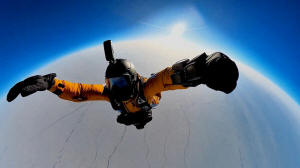|
Mikhail Korniyenko, Alexander Lynnik and Denis Yefremov hurled
themselves from an Ilyushin-76 plane at a height of 10,500
meters (34,450 feet) and spent about two and a half minutes in
freefall before opening their chutes 1,000 meters above the
ground. The descent was captured in a spectacular video.
All three suffered some frostbite to their cheeks, despite
wearing heated masks, said organizer Nikita Tsaplin. As they
plunged at a speed of more than 300 km/h, the air temperature of
around -50 Celsius (-58 Fahrenheit) felt like -70C (-94F).
They landed near Russia's Barneo polar base, where Tsaplin said
they were able to power up a server using diesel generators and
establish a connection to a satellite. The equipment had been
dropped earlier from a lower altitude.
Communications in the Arctic are likely to take on greater
importance as nations including Russia, the United States and
China compete there for resources, trade routes and military
advantage.
Tsaplin said the Russians were able to send data via an
experimental system, though he acknowledged at this point it had
nothing like the capabilities of U.S.-based Iridium
Communications Inc, which provides coverage from both the
Earth's poles.
"Of course, our solution is a prototype, but still we managed,
from our server, to connect with our satellite and to transfer
data," said Tsaplin, who is managing partner and co-founder of
Russian hosting provider RUVDS.
"Sure, it's not Iridium just yet, but we made some small steps
in that direction and that was actually the task - to see how
realistic it would be to build a low-cost solution in order to
get access from a computer to a satellite."
(Reporting by Reuters, writing by Mark Trevelyan, editing by
Christina Fincher)
[© 2024 Thomson Reuters. All rights
reserved.]
Copyright 2022 Reuters. All rights reserved. This material may
not be published, broadcast, rewritten or redistributed.
Thompson Reuters is solely responsible for this content.

|
|





